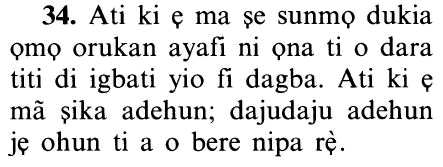17vs34
Select any filter and click on Go! to see results
وَلاَ تَقْرَبُواْ مَالَ الْيَتِيمِ إِلاَّ بِالَّتِي هِيَ أَحْسَنُ حَتَّى يَبْلُغَ أَشُدَّهُ وَأَوْفُواْ بِالْعَهْدِ إِنَّ الْعَهْدَ كَانَ مَسْؤُولاً
Wala taqraboo mala alyateemi illa biallatee hiya ahsanu hatta yablugha ashuddahu waawfoo bialAAahdi inna alAAahda kana masoolan
Yoruba Translation

Hausa Translation
Kuma kada ku kusanci dũkiyar marãya fãce dai da sifa wadda take ita ce mafi kyau, har ya isa ga mafi ƙarfinsa. Kuma ku cika alkawari. Lalle alkawari yã kasance abin tambayãwa ne.
Asbabu n-Nuzuul (Occasions of Revelation)
The Command to handle the Orphan's Wealth properly and to be Honest in Weights and Measures
Allah says;
وَلاَ تَقْرَبُواْ مَالَ الْيَتِيمِ إِلاَّ بِالَّتِي هِيَ أَحْسَنُ حَتَّى يَبْلُغَ أَشُدَّهُ ...
And come not near to the orphan's property except to improve it, until he attains the age of full strength.
meaning, do not dispose of the orphan's wealth except in a proper manner.
وَلاَ تَأْكُلُوهَآ إِسْرَافاً وَبِدَاراً أَن يَكْبَرُواْ وَمَن كَانَ غَنِيّاً فَلْيَسْتَعْفِفْ وَمَن كَانَ فَقِيراً فَلْيَأْكُلْ بِالْمَعْرُوفِ
but consume it (the orphan's property) not wastefully and hastily fearing that they should grow up, and whoever (among guardians) is rich, he should take no wages, but if he is poor, let him have for himself what is just and reasonable (according to his labor). (4:6)
In Sahih Muslim it is recorded that the Messenger of Allah said to Abu Dharr:
يَا أَبَا ذَرَ إِنِّي أَرَاكَ ضَعِيفًا، وَإِنِّي أُحِبُّ لَكَ مَا أُحِبُّ لِنَفْسِي: لَا تَأَمَّرَنَّ عَلَى اثْنَيْنِ، وَلَا تَوَلَّيَنَّ مَالَ الْيَتِيم
O Abu Dharr, I see that you are weak (in administering), and I like for you that which I like for myself. Do not let yourself be appointed as Amir over two people, and do not let yourself be appointed as guardian of an orphan's property.
... وَأَوْفُواْ بِالْعَهْدِ ...
And fulfill (every) covenant.
meaning, everything that you promise people, and the covenants that you agree to, because the person who makes a covenant or a promise will be asked about it:
... إِنَّ الْعَهْدَ كَانَ مَسْؤُولاً ﴿٣٤﴾
Verily, the covenant will be questioned about.
يقول تعالى " ولا تقربوا مال اليتيم إلا بالتي هي أحسن حتى يبلغ أشده " أي لا تتصرفوا في مال اليتيم إلا بالغبطة " ولا تأكلوها إسرافا وبدارا أن يكبروا ومن كان غنيا فليستعفف ومن كان فقيرا فليأكل بالمعروف " وقد جاء في صحيح مسلم أن رسول الله صلى الله عليه وسلم قال لأبي ذر " يا أبا ذر إني أراك ضعيفا وإني أحب لك ما أحب لنفسي لا تأمرن على اثنين ولا تولين مال يتيم " وقوله " وأوفوا بالعهد " أي الذي تعاهدون عليه الناس والعقود التي تعاملونهم بها فإن العهد والعقد كل منهما يسأل صاحبه عنه " إن العهد كان مسئولا " أي عنه .
"وأوفوا بالعهد" إذا عاهدتم الله أو الناس "مسئولا" مسئولا عنه
أي بما فيه صلاحه وتثميره , وذلك بحفظ أصوله وتثمير فروعه . وهذا أحسن الأقوال في هذا ; فإنه جامع . قال مجاهد : " ولا تقربوا مال اليتيم إلا بالتي هي أحسن " بالتجارة فيه , ولا تشتري منه ولا تستقرض .
I'raab - grammatical analysis of the Qur'an
«وَلا تَقْرَبُوا مالَ» الواو عاطفة ولا ناهية ومضارع مجزوم بحذف النون والواو فاعله و«مالَ» مفعول به والجملة معطوفة.
«الْيَتِيمِ» مضاف إليه.
«إِلَّا» أداة حصر.
«بِالَّتِي» اسم موصول مجرور بالباء ومتعلقان بتقربوا.
«هِيَ أَحْسَنُ» مبتدأ وخبر والجملة صلةز
«حَتَّى» حرف غاية وجر.
«يَبْلُغَ» مضارع منصوب بأن مضمرة بعد حتى وأن وما بعدها في تأويل مصدر في محل جر ومتعلقان بتقربوا.
«أَشُدَّهُ» مفعول به والهاء مضاف إليه.
«وَأَوْفُوا» الواو عاطفة وأمر مبني على حذف النون والواو فاعله والجملة معطوفة.
«بِالْعَهْدِ» متعلقان بأوفوا.
«إِنَّ الْعَهْدَ» إن واسمها والجملة تعليل لا محل لها.
«كانَ مَسْؤُلًا» إن وخبرها واسمها محذوف والجملة خبر.
